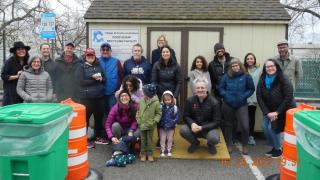Croton’s Food Scrap Recycling Program

Recycling food scraps into compost returns minerals and nutrients to the soil that would otherwise be lost when scraps are instead incinerated (Croton does not have a landfill). Doing so also reduces the cost of municipal trash management.
Between January and July 2023, Croton ran a successful 6-month pilot food scrap recycling program. That program is now open to other Croton households. Registration is required. If you wish to participate, see below for the program’s procedures and rules.
Program Basics
Each week, participants gather their scraps into compostable bags and drop them off at a service shed near the Croton train station. The scraps are picked up and trucked to a commercial composting facility (Sustainable Materials Management, a/k/a SMM) in Cortlandt Manor near Peekskill, about 8 miles north of Croton. SMM converts the scraps into compost used by local farms, municipalities, landscapers, and homeowners. Learn more about our partner at smmcompost.com.
Scraps must be properly packed…
to ensure continued success of the program. Pack only those scraps listed below as “Acceptable”. If our carter or SMM finds materials that are not acceptable (e.g., fruit and vegetable labels, twist ties, plastic bags), either can suspend pick-ups and acceptance of our scraps.
Scraps must be packed in 3 or 13-gallon compostable bags.
Bags instead labeled as “biodegradable” or “recyclable” are NOT compostable. Please leave enough room so bags can be twisted and knotted shut. Do NOT seal the bags with twist ties, rubber bands, or Scotch tape. Paper mailing labels are OK to seal bags after they have been twisted shut.
Please check that your “compostable” bags are acceptable on the BPI Website: https://products.bpiworld.org/
Rolls of 3-gallon compostable bags may be purchased online at:
https://naturbag.com/bags/
https://www.biobagusa.com
https://buyifyoucare.com/products/3-gallon-compostable-food-waste-bags
Boxes of them are available at the Super Foodtown at 2005 Albany Post Rd. and at Apple Farm Market (next to the CVS drug store) at 53 Maple Ave.)
3-gallon bags fit into a countertop scrap “caddy”. To review scrap caddy options, web search for “food scrap bin”. Standard size is 1.3 gallons and cost ~$25. Most households will fill 2-4 bags a week.
To store them between drop-offs and transport them to the drop-off site, we suggest using a 13-16 gallon kitchen trash bin with a lid. To find a raccoon-proof unit with wheels (~$55), web search for “curbside organics bin”. A food grade 5 gallon bucket with lid is also an accessible and affordable way to store and transport your bags of scraps.
The Drop-off site is…
No loose scraps, or scraps in plastic or paper bags, will be accepted. The site is closed at other times and days.
Place your closed bags into any of the large green bins in front of the service shed. Do NOT leave any bags on the ground.
For questions or to register for participation…
…email Keiko Niccolini at keikoniccolini@gmail.com. Put “Food Scrap Registration” in the subject line. In the email, include your name, email address, and home phone number. Responses may take up to a week, so please be patient.
What can (and cannot) be included…
Please check that your “compostable” products are acceptable on the BPI Website: https://products.bpiworld.org/
Acceptable Food Scraps
- All foods
- Meat
- Bones
- Shellfish
- Eggs and eggshells
- Vegetables
- Beans
- Grains
- Bread, flour, pasta and cereals
- Coffee grounds and filters
- Tea and tea bags
- Tree debris (that fits into compostable bags)
Not acceptable
- Non-compostables
- Glass
- Metal
- Clean, recyclable paper
- Plastics
- Plastic foams
- Juice boxes and pouches
- Milk cartons
- Rubber bands
- Twist ties
- Produce stickers
- Animal feces
- Cat litter
- Medical waste
- Hazardous waste (cleaning supplies, chemicals)
- Electronic waste

